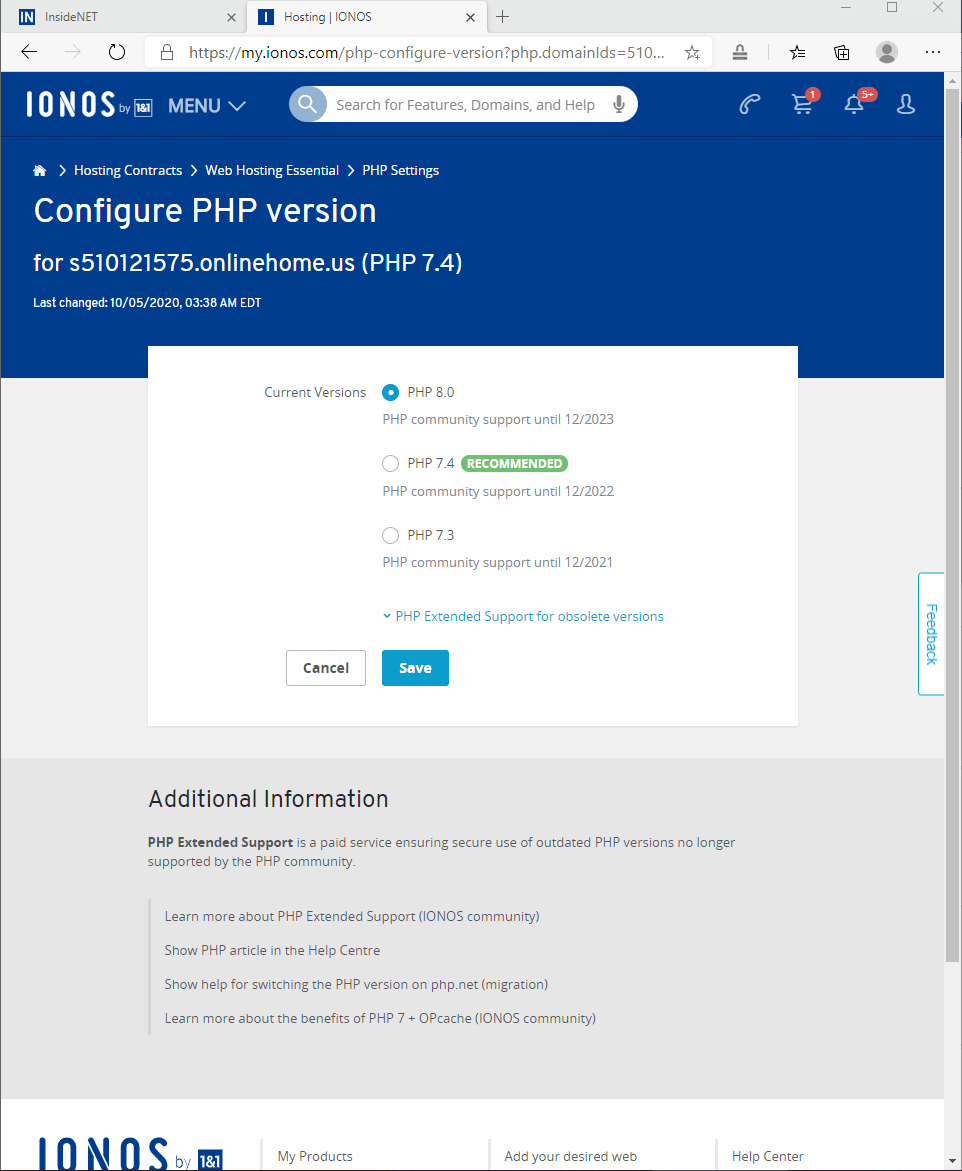PHP 8: What you need to know about the latest version
PHP is one of the programming languages that is easiest to learn. With a PHP tutorial and the right motivation, you can write the first scripts and execute commands within a few hours. PHP 7 introduced speed optimization, which led to an improved ranking. Now the open-source language has received a major update to version 8.0. A year later, version 8.1 is available.
IONOS offers flexible and secure PHP web hosting for private users and companies of any size. If your needs grow, you can easily switch to a bigger package with just a few clicks.
PHP 8.1 has now been released in beta and is currently being tested. The final update won’t follow until November 2021, but the new features are already known. You can expect the following new features:
- Enum: So-called enumerations (enumerations with a specified number of values) are now available as a variable type.
- Fibers: The new code block type Fibers gives you the ability to run multiple program threads in parallel.
- Arrays: Since PHP 7.4, it’s been possible to unpack arrays with numeric values. Now this is also possible for arrays with strings.
- Readonly: Class properties can be marked as 'readonly' from now on and are thus no longer modifiable.
- Intersection: Intersection Types (basically the counterparts to Union Types) are now available.
- Never: The new return value 'never' indicates that a function will terminate and return no other value.
- Final: You can now mark class constants with 'final' so they can’t be changed by subclasses.
- Fsync: PHP 8.1 introduces the two functions 'fsync' and 'fdatasync' to synchronize data from the buffer to the storage medium.
- Octal: To indicate the octal number system, in addition to '0' (zero), the prefix '0o' (zero and small O) can be used in the future.
- Globals: The use of '$GLOBALS' has been slightly restricted and now results in an error message in some cases.
- Null: Internal functions will no longer accept null values on non-nullable arguments.
This is just a sampling of the most interesting changes in PHP 8.1. Many more planned new features can be found on the official Wiki with all Request for Comments.
PHP 8 release in November 2020
On 26 November 2020, PHP 8.0.0 - the latest edition of the popular scripting language - was released. This corresponds to the normal three-year cycle for PHP. The predecessor PHP 7.4 was around for about a year after support for PHP 7.1 was discontinued. Support for PHP 7.2 also ended at the end of 2020. Many websites developed in PHP still rely on the old versions. Although this is technically possible, it is not recommended. Keeping your website code up-to-date and switching to new versions of PHP has various advantages: New functions offer more variety, performance can be massively increased, and security gaps are closed.
Try PHP 8 now! You aren’t an IONOS customer yet? Then book one of our cheap web hosting offers now. You can then change the PHP version used in your IONOS customer account and switch to PHP 8 or PHP 8.1 (as soon as it’s available).
What are the problems with the old code?
Because PHP 8 is a major new release, one should expect old code to no longer be compatible. However, most of the changes that could lead to complications were already addressed in versions 7.2, 7.3, and 7.4.
The latest changes include:
- The real type
- Magic quotes legacy
- array_key_exists() with objects
- FILTER_SANITIZE_MAGIC_QUOTES filter
- Reflection export() methods
- mb_strrpos() with encoding as 3rd argument
- implode() parameter order mix
- Unbinding $this from non-static closures
- hebrevc() function
- convert_cyr_string() function
- money_format() function
- ezmlm_hash() function
- restore_include_path() function
- allow_url_include ini directive
If you have always kept your code up to date, you won’t have any problems migrating to PHP 8, even if the new update is a major release without backward compatible changes. A complete list of changes can be found on the PHP project site.
Microsoft has announced that it will no longer provide Windows support for PHP 8 and later versions. However, PHP developers have already announced their intention to close this loophole themselves.
These are the new PHP 8 features
The new version of PHP has some new features that provide web developers with lots of additional possibilities. Here we have summarized the most important adjustments compared to the predecessors.
On November 30, 2020, the PHP 7.2 version reached its official end-of-life (EOL) date and will no longer be supported. For more on this, see our article on this topic.
JIT Compiler
Among the major new features of PHP 8 is the JIT compiler, which improves performance significantly. PHP is not compiled but interpreted line by line. The JIT compiler (Just in Time) works by compiling parts of the code during runtime - and in doing so acts very much like a cached version of the code.
This new feature in PHP 8 has already been tested by Pedro Escudero. He used a simple script to compare versions 5.3, 7.4, and 8 (with and without JIT). For this purpose, he ran the script 100 times in each version and then calculated the average time.
The following average values were the results of his testing:
| Version | Time in Seconds |
|---|---|
| 5.3 | 0.64574003219604 |
| 7.4 | 0.10253500938416 |
| 8 (without JIT) | 0.098223924636841 |
| 8 (with JIT) | 0.053637981414795 |
Even if changing from version 7.4 to 8 without JIT does not make much difference, the difference to version 8 with JIT is significant. The JIT Compiler improves performance by more than 45 percent.
Union Types
Union Types are known from other languages like C/C++, TypeScript or Haskell. Here two or more types can form a union and any of the types mentioned can be used. In the code itself this can look like this:
public function foo(Foo|Bar $input): int|float;However, there is one restriction, because void cannot become part of a union type; it does not output a return value. Also, nullable unions can be declared with |null or ? as in this example:
public function foo(Foo|null $foo): void;
public function bar(?Bar $bar): void;Static return type
Static is a special class name and becomes a valid return type in the new version besides self & parent.
WeakMap
WeakRefs were already added in PHP 7.4. With PHP 8, however, WeakMaps have been included which are the extension of this function. WeakMaps and WeakRefs can be used to delete objects when only the cache references the entity classes of the objects. This leads to resource-saving handling of the objects. An example from the documentation is as follows:
class FooBar {
private WeakMap $cache;
public function getSomethingWithCaching(object $obj) {
return $this->cache[$obj] ??= $this->computeSomethingExpensive($obj);
}
// ...
}Use ::class for objects
In earlier versions, you had to use get_class() to assign a class to objects. But now, you can apply ::class to objects. This ensures that the source code is kept slimmer.
Stringable interface
The Stringable interface is automatically added to classes that implement the __toString() method. Previously, this step had to be done manually. The code looks like this:
class Foo
{
public function __toString(): string
{
return 'foo';
}
}
function bar(Stringable $stringable) { /* … */ }
bar(new Foo());
bar('abc');fdiv
Using the new fdiv() function, division with 0 is allowed. You now get INF, -INF or NAN as return value.
Type errors
Previously, only user-defined functions triggered TypeErrors. Internal functions issued a warning and null. In PHP 8 most internal functions now also return a type error.
New classification for engine warnings
Till PHP 8, there were lots of errors that only issued a warning or note. This has now been updated. A full listing of the new PHP error messages can be found in the documentation.
Correct signature of magic methods
In previous PHP versions, it was possible to write magic methods with signatures that did not match the expected signature, for example __clone(): float or __isset(): Closure. Since the introduction of PHP 7.0, the correct use of magic methods has only been randomly checked. Various parameter and return value checks have been added to the new version to ensure that the signatures are correct.
Reflection
The Reflection signatures have been changed. Originally, Reflection was specified as follows:
ReflectionClass::newInstance($args);
ReflectionFunction::invoke($args);
ReflectionMethod::invoke($object, $args);However, in PHP 8 it is now written like this:
ReflectionClass::newInstance(...$args);
ReflectionFunction::invoke(...$args);
ReflectionMethod::invoke($object, ...$args);To support PHP 7 & PHP 8 at the same time, you should proceed as follows:
ReflectionClass::newInstance($arg = null, ...$args);
ReflectionFunction::invoke($arg = null, ...$args);
ReflectionMethod::invoke($object, $arg = null, ...$args);You haven’t got your own website up and running yet? You can expect a lot of flexibility and the best performance with virtual servers from IONOS. Choose the solution that best fits your project.









